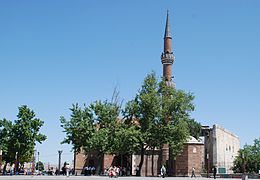Haji Bayram Veli
Hacı Bayram-ı Veli | |
|---|---|
 | |
| Title | The cenotaph of "Hacı Bayram-ı Veli" is located inside Hacı Bayram Mosque's Türbe in Ulus, Ankara |
| Personal | |
| Born | 1352 Solfasol Village, Ankara |
| Died | 1430 |
| Religion | Islam |
| Era | Medieval |
| Region | Ottoman Empire, Anatolia |
| Creed | Originally Hanbali Sufi and later Qarmatian Batiniyya |
| Main interest(s) | Sufi poetry, Dhikr |
| Notable idea(s) | Bayramiyya tariqah |
| Muslim leader | |
Influenced by | |
Influenced
| |
Hacı Bayram-ı Veli (Arabic: رحمت الله عليه) (1352–1430) was a Turkish poet, a Sufi, and the founder of the Bayrami Sufi sect.[1] He also composed a number of hymns.[1]
| Part of a series on Islam Sufism |
|---|
 |
|
|
Biography
Early life
He lived between 1352 and 1430. His original name was Numan, he changed it to Bayram after he met his spiritual leader Somuncu Baba during the festival of Eid ul-Adha (called Kurban Bayramı in Turkish).
Hacı Bayram was born in small village in Ankara Province, and became a scholar of Islam. His life changed after he received instruction in Sufism in the city of Kayseri from Shāikh Hāmeed Hāmeed’ūd-Dīn-ee Wālī, who was actually one of the mursheeds of the "Sāfav’īyyah Tariqah Sheikh Khoja Alā ad-Dīn Alī".
Pilgrimage and the foundation of his sect
The two mystics, Shāikh Hāmeed’ūd-Dīn-ee Wālī and Hacı Bayram, were living in the city of Bursa when they made the Hajj (pilgrimage to Mecca) together. During this holy journey Hāmeed’ūd-Dīn-ee Wālī continued to teach sufism. Shāikh Hāmeed’ūd-Dīn died in 1412 passing his authority to Hacı Bayram-ı Veli, who returned to Ankara as the sheikh (leader) of an Islamic sufi sect called Bayrami.[2] He built a Dervish lodge on the site in Ankara where his tomb and mosque stand today. People came to stay there and learn about sufism. The sect grew popular with Bayram's successful teaching.
Akşemseddin (Aqq-Shams’ūd-Dīn)[3] and Hacı Bayram
The growth of the sect perturbed some local authorities; they shared their worries with the Ottoman Sultan Murad II, who called Hacı Bayram to Edirne (the capital of the Ottoman Empire at that time). The Sultan wanted to test the opinions, doctrine and the patriotism of the sect. At this time in Anatolia there were many independent Turkish clans with little unity among them.
Hacı Bayram took another scholar, his murid Akşemseddin (Aqq-Shams’ūd-Dīn), with him to Edirne to meet the Sultan. Murad soon understood that the complaints against Bayram were merely rumours and Hacı Bayram and Akşemseddin (Aqq-Shams’ūd-Dīn) stayed for a while in Edirne, lecturing and preaching to the court. He had more private consultations with the Sultan in which they discussed matters of the world, life and the future.
In particular the Sultan was concerned with the conquest of Constantinople, the Byzantine capital that the armies of Islam had struggled to conquer without success. The Sultan asked Bayram directly, "Who will conquer the city?" The reply came: "You will not. But this baby shall. You and I will not be alive at the time of that conquest. But my student Akşemseddin (Aqq-Shams’ūd-Dīn) will be there." The baby was the Sultan’s son, the future Mehmed II, who would conquer the city (which later became known as Istanbul) in 1453 and receive the title Fatih (meaning the conqueror).
Hacı Bayram requested that his student Akşemseddin (Aqq-Shams’ūd-Dīn) be the teacher of the baby Mehmed, and Sultan Murad agreed. Hacı Bayram made a few more trips to Edirne until he died in 1430 in Ankara, passing the leadership of his sect to Akşemseddin (Aqq-Shams’ūd-Dīn). His tomb[2] and the mosque dedicated to him are in Ankara.[4]
Gallery
-
The minaret.
-
The entire vliew of the building.
-
The walls of Hacı Bayram Mosque, Ulus, Ankara, Turkey. (Exterior view)
-
The entrance door of his türbe.
-
Interior view of the "Hacı Bayram Mosque".
-
The exterior view of Ankara Haci Bayram Mosque - The wall of the Monumentum Ancyranum is seen at right.
-
Hacı Bayram Mosque is located next to Monumentum Ancyranum in Ulus
See also
External links
Notes
- ^ a b Levine, Lynn A. (editor) (2006) "Hacı Bayram Mosque (Hacı Bayram Camii)" Frommer's Turkey (4th edition) Wiley, Hoboken, New Jersey, page 371, ISBN 0-471-78556-3
- ^ a b Taji-Farouki, Suha (2007) Beshara and Ibn 'Arabi: a movement of Sufi spirituality in the modern world, Anqa, Oxford, England, page 158, ISBN 978-1-905937-00-4
- ^ Ak (Aqq in Turkish) means "The Pure White".
- ^ Davis, Ben (editor) (2003) Let's Go Turkey St. Martin's Press, New York, page 398, ISBN 0-312-30597-4








